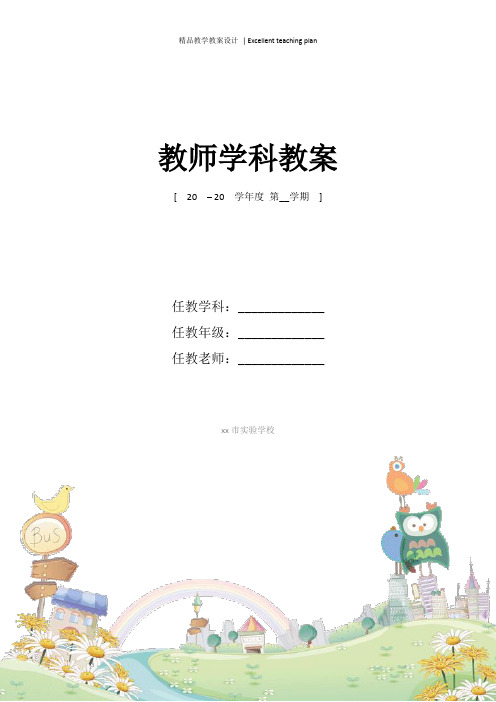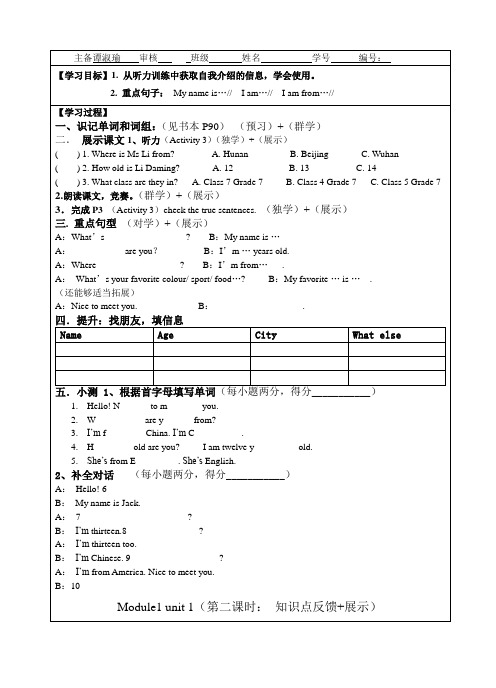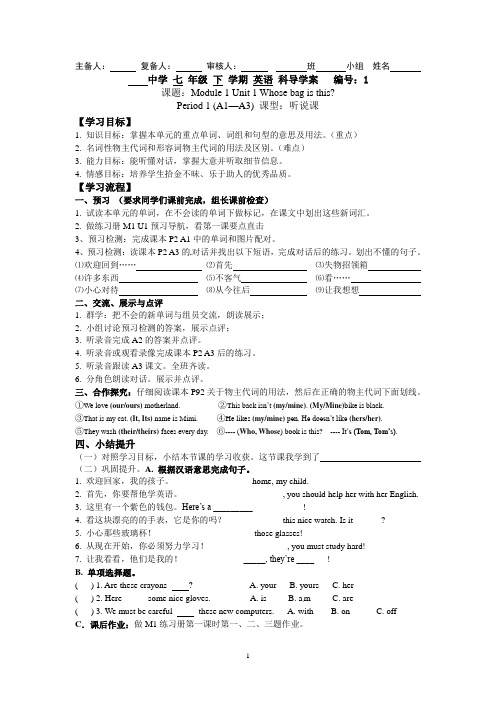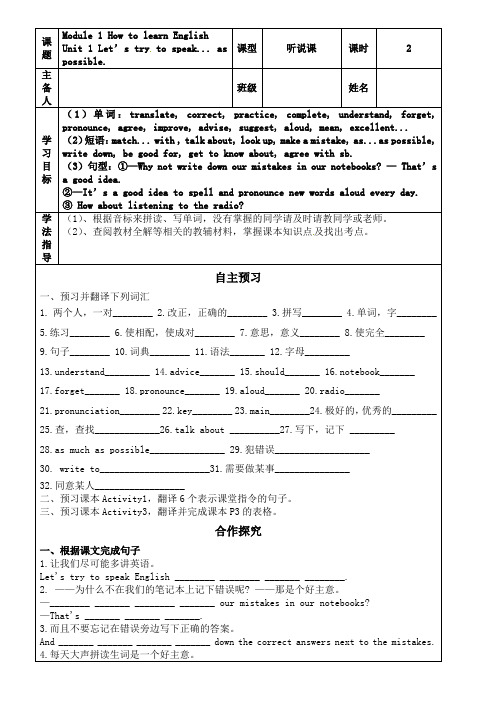M1Unit1【来自名校的集体备课导学案】
- 格式:docx
- 大小:18.18 KB
- 文档页数:5

教师学科教案[ 20 – 20 学年度第__学期]任教学科:_____________任教年级:_____________任教老师:_____________xx市实验学校Module 1 Unit 1 It's more than twenty thousand 【导学目标】学习目标(Learning aims):1.知识目标(Knowledge aims):①能够听说读写四会单词 postcard more thousand kilometer million;②会翻译课文,背诵课文;③能运用重要句型:A:These postcard are great!B:Yes, they are.A:Tell me more about the Great Wall. How long is it?B: It’s about six thousand seven hundred kilometers.2.能力目标(Ability aims):培养学生自学能力以及使用英语简单进行交流的能力。
3.情感目标(Emotional goal):通过这篇课文的学习让学生对英语学习产生更多的兴趣,对长城的了解,培养学生爱国之心。
【导学重难点】背诵课文以及熟记单词【导学过程】一.自主预习(1)I can read the words.我会读下面的单词。
postcard more thousand kilometer million(2)I know the sentence.我知道下面的句子。
A:These postcard are great!B:Yes, they are.A:Tell me more about the Great Wall. How long is it?B: It’s about six thousand seven hundred kilometers.二.自主乐学、合作交流1.小组成员互相检查预习情况。


正德中学高三英语导学案 M1 U1 reading一、重点单词二、重点短语1、_________vt.出席,参加 1、______________________________注意2、_________vt.获得;赚,挣得 2、______________________(书的)封底3、_________n.&vt.尊敬,敬重 3、________________________一代又一代4、_________vt.赢得,取得;实现,成就 4、________________________平均5、_________n.学分;成绩;等级 5、_______________________过去常常做6、_________n.文学 6、_______________________逐字地7、_________adj.一般的,普通的;平均的 7、________________________首先8、_________adj.具有挑战性的 8、_____________________介绍……给……9、_________adj.额外的,外加的 10、_________vt.&vi.准备 11、_________vt.放弃12、_________vt.思念,想念 13、_________vt.经历,体验 14、_________vt.介绍三、Language points:1. Going to a British high school for one year was a very enjoyable and exciting experience for me.●本句是主谓表结构(SVC),句中going to a British high school for one year是动名词短语,作主语。
动名词短语的作用相当于一个名词,在句中常作主语、宾语或表语。
例如:Reading French is easier than speaking it.●句中exciting是现在分词,相当于形容词,作定语,修饰experience.注意:英语中有一类及物动词,在词尾加-ing或-ed后,相当一个形容词,但意义不同。

中学七年级下学期英语科导学案编号:1课题:Module 1 Unit 1 Whose bag is this?Period 1 (A1—A3) 课型:听说课【学习目标】1. 知识目标:掌握本单元的重点单词、词组和句型的意思及用法。
(重点)2. 名词性物主代词和形容词物主代词的用法及区别。
(难点)3. 能力目标:能听懂对话,掌握大意并听取细节信息。
4. 情感目标:培养学生拾金不昧、乐于助人的优秀品质。
【学习流程】一、预习(要求同学们课前完成,组长课前检查)1. 试读本单元的单词,在不会读的单词下做标记,在课文中划出这些新词汇。
2. 做练习册M1 U1预习导航,看第一课要点直击3、预习检测:完成课本P2 A1中的单词和图片配对。
4、预习检测:读课本P2 A3的对话并找出以下短语,完成对话后的练习。
划出不懂的句子。
⑴欢迎回到……⑵首先⑶失物招领箱⑷许多东西⑸不客气⑹看……⑺小心对待⑻从今往后⑼让我想想二、交流、展示与点评1. 群学:把不会的新单词与组员交流,朗读展示;2. 小组讨论预习检测的答案,展示点评;3. 听录音完成A2的答案并点评。
4. 听录音或观看录像完成课本P2 A3后的练习。
5. 听录音跟读A3课文。
全班齐读。
6. 分角色朗读对话。
展示并点评。
三、合作探究:仔细阅读课本P92关于物主代词的用法,然后在正确的物主代词下面划线。
①We love (our/ours) motherland. ②This back isn’t (my/mine). (My/Mine)bike is black.③That is my cat. (It, Its) name is Mimi.④He likes (my/mine)pen. He doesn’t like (hers/her).⑤They wash (their/theirs) faces every day. ⑥---- (Who, Whose) book is this? ---- It’s (Tom, Tom’s).四、小结提升(一)对照学习目标,小结本节课的学习收获。


课题Module 1 How to learn EnglishUnit 1 Let’s try to speak... aspossible.课型听说课课时 2主备人班级姓名学习目标(1)单词:translate, correct, practice, complete, understand, forget, pronounce, agree, improve, advise, suggest, aloud, mean, excellent... (2)短语:match... with , talk about, look up, make a mistake, as...as possible, write down, be good for, get to know about, agree with sb.(3)句型:①—Why not write down our mistakes in our notebooks? — That’sa good idea.②—It’s a good idea to spell and pronounce new words aloud every day.③ How about listening to the radio?学法指导(1)、根据音标来拼读、写单词,没有掌握的同学请及时请教同学或老师。
(2)、查阅教材全解等相关的教辅材料,掌握课本知识点及找出考点。
自主预习一、预习并翻译下列词汇1.两个人,一对________2.改正,正确的________3.拼写________4.单词,字________5.练习________6.使相配,使成对________7.意思,意义________8.使完全________9.句子________ 10.词典________ 11.语法_______ 12.字母_________13.understand_________ 14.advice_______ 15.should_______ 16.notebook_______ 17.forget_______ 18.pronounce_______ 19.aloud_______ 20.radio_______21.pronunciation________ 22.key________ 23.main________24.极好的,优秀的_________ 25.查,查找_____________26.talk about __________27.写下,记下 _________28.as much as possible_______________ 29.犯错误___________________30. write to______________________31.需要做某事_______________32.同意某人__________________[二、预习课本Activity1,翻译6个表示课堂指令的句子。
七年级英语上册Module 1导学案Unit 1 主备人:【课前朗读词汇】Chinese, from, where, year, about, what about…, Ms, America, not, England, hi, American, our, grade, he, China【学习目标】✍能听懂别人的自我介绍;✍能听懂包含自我介绍的简短对话;✍能利用be动词作简单的自我介绍或询问对方个人信息。
④能够学会以下音标:/i:/ /ɪ/ /e/ /æ/【学习重难点】如何得体的介绍自己和介绍别人;如何对新同学表示关心和对他们提供帮助。
【自学提示,知识点拨】1. Nice to meet you! 很快乐见到你!双方初次见面经介绍后常说:Nice to meet/see you! 或 Glad to meet/see you!答语:Nice to meet you, too. 〔很快乐认识你〕陌生人初次见面常说:How do you do? 答语为:How do you do?〔您好〕2. Where are you from? 你来自哪里?I’m from Wuhan. 我来自武汉。
be from表示“来自…〞相当于come from表示“来自…〞例如:I come from Wuhan. Tony comes from England.Where +be动词+主语+from ?意为“某人来自哪里?〞For example:玲玲来自哪里?/玲玲是哪里人?—她来自北京/她是北京人。
A.______ is Lingling______? She ______ from Beijing.B. ______ does Lingling _______from? She______ from Beijing.3. I’m thirteen years old. 我十三岁对年龄提问用特殊疑问词“how old〞。
Module__1__Unit___1__(第__1__课时) 导学案年级: 班级: 姓名:学习目标1.能熟读下列单词和短语:letter,vocabulary,pronunciation,grammar,spelling,translate,punctuation…2.能听懂对话内容。
3.能听、读、说下列句型:1) How/What about …2) Would you like …3) Let’s …4)Why don’t you…/Why not…5)You should/shouldn’t …6)It’s better (not)学习内容I.用英语读出并写出以下单词:1 . 语法2 . 使完全3 . 句子4 . 改正5 . 拼写6 . 练习7 . 词典8 . 字母9 . 理解、明白10 . 建议11 . 应该12 . 发……的音13 . 大声地14 . 电台,广播15 . 关键性的16 . 主要的17 . 极好的,优秀的II.Listen and fill the blanks according to the dialogue•speak English as _____ as ________ •write down our ________ in our notebooks•the _______ answers •_________ new words aloud•don’t need to understand ___________•know a lot about the world through ______•find some English __________III.Read and check:T or F1. Speak Chinese in class.2. Write down the mistakes in the notebooks.3. Write down the correct answers next to the mistakes.4. Spell and pronounce new words aloud every day.5. Listen to English radio programme.6. Read English stories.7. Understand every word when listening to the radio.IV. Read and fill in the blanksJ: You ______ always speak English in class. And you _______ write down your mistakes in your notebooks. And _________ you write down the correct spelling and grammar next to the mistakes? What else?L: It’s __________ to check your vocabulary notebook every day.J: That’s a good idea. Thanks a lot, Lingling. __________ listening to the radio or reading a newspaper in English? But ________ to translate every word.L: I think everyone ________ have a pen friend and write email messages to each other. I’m going to meet my pen friend in Beijing this term.V . Homework一、根据句意及汉语提示完成单词。
2014-2015学年第二学期五年级英语学科集体备课记录学科:英语主备人:邓艳丽复核人:时间:总课时:3课时分课时:第1课时课题:M1-U1 we lived in a smallhouse.Step 1学习目标:1、我会听说读写本课的单词。
2、我能根据情境正确使用There be …,We lived…many years ago. We live… now.句型谈论生活、学习中的事物。
3、比较过去与现在的生活,体会我们现在生活的幸福,培养学生的爱国主义情操。
Step 2学习过程:1、展示课本图片,让学生自己谈一谈图中的内容,用上以前学过的句型:“There is/are......”。
2、播放课文录音,让学生在听录音的同时找出课文中出现的新单词与新句型。
3、进行游戏“火眼金睛找生词新句”。
4、再次播放录音,让学生大声跟读课文,然后小组分工合作分角色朗读课文。
5、重点句式操练。
让他们灵活运用句式:There is/are .../Therewas/were ...造句。
Step 3课堂检测:一、短语互译:1、许多年以前______________2、lots of food ____________3、talk to...______________4、很多公交车____________5、足够的食物______________二、完成句子:1、Life _____ very different in china many years ago.2、There _____ any televisions many years ago.3、There _____ lots of buses and cars now.4、There _____ too many pupils in this school two years ago.St Step 4家庭作业:回家后问问自己的爷爷、奶奶、外公或外婆,他们以前的生活与现在的生活有什么不一样。
Module 1 Unit 1 School lifePeriod 1-2 Welcome to the unit & Reading课文阅读导学案学习目标1. 掌握阅读策略,准确把握文章主旨并流利复述,提高阅读理解能力。
2. 积极讨论、踊跃展示、疯狂背诵,熟练运用所学,高效达成目标。
3. 了解英国学生的学习生活,感受中英校园生活的差异,努力学好英语。
4. 激情投入,享受学习的快乐。
【课前预习】完成预习案I . Think about the following questionWhat are some differences between the lives of Chinese and British high school students? Life Study Activitiesn . Read the passageSchool life in the UK and answer the following questions.1) Who was the girl who sat next to Wei Hua during the assembly?2) Why was the homework in the British school a bit challenging for Wei Hua at first?3) What did Wei Hua make for the class party at the end of term?4) What did Wei Hua think of her life in the UK?川.Decide whether the following statements are True(T) or False (F).1) Wei Hua likes the school hours in the UK. ( )2) British schools and Chinese schools both encourage students to work hard. ( )3) Wei Hua 'sfavorite teacher is Mr. Heywood. ( )4) British students always have the same classrooms and classmates. ( )5) Wei Hua could send e-mails to her family back home for free in the Computer Club. ( )6) British students have to study English and French. ( )7) Wei Hua is now back in Manchester again. ( )IV . Choose the best answer.1) Which of the following statements is TRUE according to the passage?A. What the headmaster told them sounded like what she used to hear in China.B. She used to get up 8 a.m. in China.C. She was such a good cook that she liked cooking British food.D. She didn'tlike History or Art, so she chose Woodwork.2) What is the main idea of the passage?A. Her English improved a lot as she used English every day.B. School life in the UK is busy and bitter.C. She had a wonderful experience in a British school.D. She was happy with the British school hours.3) Which of the following has the closest meaning to “I could e-mail my family and friends backhome for free ”?A. I could e-mail my family and friends back home without paying money.B. I could e-mail my family and friends back home freely.C. I could e-mail my family and friends in my free time.D. I could be free to e-mail my family and friends back home.4) The writer 's purpose of writing this passage is _____ .A. to tell us that she doesn 't like school life in BritainB. to excite more students to study abroadC. to improve her EnglishD. to introduce her exciting and happy school life in Britain5) She felt lucky because _____ .A. she could get up an hour later than usualB. the headmaster told them to earn respect by working hard and achieving high gradesC. she had been given a golden opportunity to study in Britain and met helpful and friendly teachersand classmatesD. she improved her EnglishV .在课文原文中标记出下列单词和短语并翻译。
单词翻译2. achieve3. literature 5. struggle ____7. encouragement9. extra _______ 11. sculpture短语翻译1. hall4. average __ 6. challenging 8. improve __ 10. choose __ 12. relax 1. an enjoyable and exciting experience2. be happy with ________________4. attend an assembly ____________6. devote …to …3. than usual 5. earn respect 7. sound like __ 9. for free ___ 8. used to do _________________10. be fond of _______________12. experience a different way of life 【我的疑问】请将你未能解决的问题和有疑惑的问题写下来,等待与老师和同学探究解决。
11. look back on【课内探究】体验英国高中生活一.语篇探究I . Fill in the blanks of the following form, using 3 words for each at most. School life in the UKb. 一次难忘的经历 _________________________________________c. 出国留学是一件有挑战性的事情。
___________________________________2. I sat next to a girl whose name was Diana. (p age2, lines6-7)next to 意思是 __________________ ; whose 引导 __________ 从句,修饰先行词翻译全句 __________________________________________________3. The best way to earn resp ect was to devote ourselves to study and achieve high grades.(p age2, lines10-11)1) 句中 ______________________ 单词way 的定语。
2) devote 有何搭酉己 ________3) 翻译a. 学习英语的最好方法是多操练。
语言点探究I . Finish Part D on P4n . Analyze (分析)the following sentences.1. Going to a British high school for one year was a very enjoyable and exciting experience for me. (p age2, lines1-2)划出句子主语并说出这是有什么结构充当主语。
_______________________本句中 experienee 意思是 ___________________ ,为可数名词,但表示 ____不可数名词。
它还可以做 vt.,意思是 ____________________________ .翻译将上句翻译成汉语 __________________________________________________1)2) 3) a. 时为充当单词way 的定语,还可用短语充当b. 他整个一生致力于教育。
4. It was a struggle for me __ 1) 补全句子 2) 句中 it 为 ____________3) 翻译在这演讲真是一件荣幸的事情。
5. I found that the homework was not as heavy (page2, lines20-21)补全句子 not as …as … 也可说成 句中 that 引导 _______________ 从句, what 引导 从句。